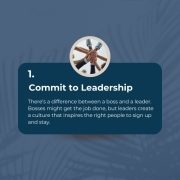Employee Engagement: Is it Really The Boss’s Responsibility?
I grew up in a day and age well before “employee engagement”. I had five different jobs before I finished my university education: I worked on farms and ranches, survey crews, a cement company, a geriatrics unit in a psychiatric hospital, and as a janitor. I learned a lot in those jobs. I learned the value of education, to value people who were skilled at a trade, and the value of hard work.
I remember when, after pouring concrete for ten straight hours, the foreman over heard me complaining about how much I hated the work. He took me aside and said, “Son, we don’t have complainers on this crew. They call this thing work because you get paid to work. You don’t get paid to sit around. If you want to sit around, stay at home and don’t get paid. We pay you well to work, but we don’t pay you to complain. Do that on your own time.”
If I would have talked my bosses in those days about “employee engagement,” I believe they would have thought I had beans for brains. I can picture the foreman on the concrete crew saying, “My work is to get the job done; not to motivate you.”
I know we have supposedly come a long way and are now purportedly smarter in how we manage people, and allegedly are more skilled in the practice of leadership. While everyone agrees than an engaged workforce is beneficial, all of the insights and leadership efforts haven’t moved the dial much on getting them there. In all our efforts to create an engaging environment in our workplaces, I’ve never seen more entitlement.
Like children, the more people do for us, the more we expect. When I was a family counselor, I noticed an intriguing phenomenon: the children in a family that are the angriest at their parents are often the children who have been given the most.
Don’t get me wrong. I think it’s wonderful to learn to communicate with our staff and create an engaging, inspiring work environment. There is lot of research that says happier, more engaged employees are more productive.
Here are five responsibilities of a boss that will help engage employees:
- Help create a clear vision. People largely change for one two reasons: inspiration or desperation. Great leaders create a powerful why, a clear and compelling shared purpose or cause that inspires.
- Hire the right people. (I know, many of you had no choice over the employees that work on your teams; you are already behind the eight ball).
- Be clear about what is expected. Ambiguity breeds mediocrity. You need to provide clarity as to the operational accountabilities as well as the kind of attitude that is needed to do the job, and build a link between each employee’s contribution to the why.
- Support your team with a servant mind-set. Service leadership doesn’t mean pleasing leadership. Service leadership means understanding what supports are required for your employees to get their job done, and that you have their back to do whatever you can to give them the resources and capabilities to do what is expected. What your job isn’t, is to make them happy.
- Hold them accountable by following through on the consequences. “Everyone on your team knows who is and who isn’t performing, and they are looking to you as the boss to do something about it.” said Colin Powell, the Former United States National Security Advisor. There are consequences to actions, both negative and positive. You don’t build a great place to work when you have low standards or when you let people off the hook. People need to see courage in their leaders, not coddling.
There is, no doubt, a need for caring in the workplace. We absolutely have to support and encourage people and create a place where they can feel safe to be honest and who they are. But let’s be careful because too much support and not enough demands can breed a culture of complaint and entitlement.
What I’m saying is that I’m not convinced that it’s the boss’s responsibility to get an employee engaged. If you can, that’s great. And if you can’t, don’t lose any sleep over it. It’s not your responsibility. Either people want to get their heart into the game or they don’t. You can still be a great leader even if you don’t get everyone on board. Relax and enjoy leading. Who knows? Maybe we’d be better off if bosses got back to what their ultimate job is: to make sure the job gets done and gets done well.









